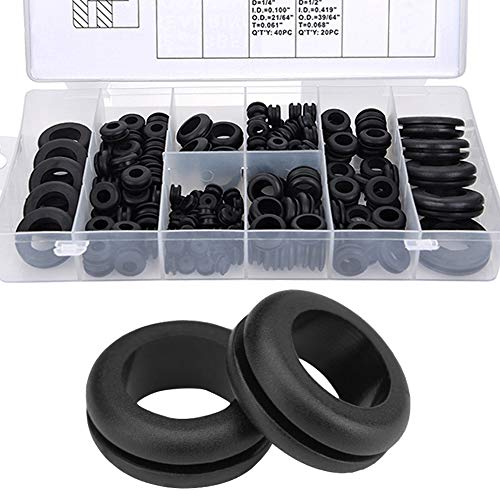Hey! This site is reader-supported and we earn commissions if you purchase products from retailers after clicking on a link from our site.
Air compressors are handy machines to have at home as they can help you a number of different ways. They work by compressing air in order to increase the pressure in air for use at the end of line. As the machines have multiple parts, any machine in the world will make some noise.
Air compressor that comes with a high price used to make less noise. But, there must be ways to reduce the noise of your existing air compressor, right? This article will provide you with all the relevant information on why your air compressor is making noise and how you can reduce it.
Table of Contents
- What is the Noise Level of an Air Compressor?
- Why are Air Compressors so Loud?
- How to Quiet an Air Compressor Methods
- Safety Advice
- FAQs (Frequently Asked Questions)
What is the Noise Level of an Air Compressor?
Before getting into the causes of air compressor noise. It is important to understand what is considered as too much noise. Sound is measured by the international standard decibel (dB). Typically an air compressor will make noise levels up to around 95 dB which is above the exposure limit value of 87 dB.
Most common small compressors of 1 HP or less have noise levels around 80 to 90 dB or more, while comparable quiet models range from 40 db to 79 dB. You can purchase quiet air compressors that make noise below 70 dB and this can be considered tolerable. That is not too high for a home environment, however, you may want to have more quietness at home.
To get an idea of the difference in sound, an 80 dB compressor is twice as loud as a 70 dB model and four times louder than a 60 dB compressor. OSHA (Occupational Safety& Health Administration) states extended exposure to sound levels above 85 dB can cause permanent hearing loss, so you’ll want to quiet that noise down to acceptable safe levels or wear hearing protection to protect your ears.
Older compressors or maybe cheaper compressors on the market are not optimized to perform so quietly. And as a result, you may notice a huge noise level in the compressor which is intolerable. You may ask, how can I find the noise level of my air compressor? Given technology advancements over the years, you can now simply measure it with an app on your smartphone! Download one from your app store and identify the sound level of your air compressor, or locate a professional tool to do so.
Why are Air Compressors so Loud?
There are several reasons why an air compressor may be so loud. We’ll examine each factor, and you may then be able to solve it efficiently!
Size & Type of Air Compressor
First of all, the size and type of air compressor you have can directly affect the amount of noise it generates. Larger air compressors will suck in more air and, therefore, require an engine with greater power to efficiently pressurize the air.
Needless to say, the bigger the compressor, the more powerful the motor, and then a resulting louder operation. Though, there are some types of air compressors available that are designed in a special way so that they run as quietly as possible.
Vibrations
The vibrations of the air compressor can contribute to a considerable amount of noise being made. These vibrations are typically due to the fittings and type of compressor. If the compressor is assembled in the wrong way, this provides a good chance that the compressor will vibrate a lot. Even if the compressor is installed correctly, some parts may cause loud noises to be exerted due to vibration.
If the air compressor is sitting on top of a shaky or weak surface then it will make a lot of noise. Similarly, if the air compressor itself contains hollow or shallow parts, vibrations will cause more noises to be heard. Hard surfaces will not absorb the compressor vibrations, and so, the total noise level will increase.
Placement
Leading on from the last point, the noise of an air compressor hugely depends on the exact position it is placed. Hard surfaces like hardwood or concrete will make the compressor make more noise during operation as the noise is intensified by creating echoes.
Uneven or shaky surfaces won’t allow the air compressor to set properly. Therefore, you should make sure that you set the compressor on an even surface, or on a material that will absorb the vibrations.
Exhaust
The air exhaust is one of the loudest components on an air compressor. If you do not have a proper exhaust system on your air compressor then it will make intolerable noise. All byproducts resulting from the operation of your air compressor are discharged through the compressor’s exhaust, which will generate significant noise levels.
Intake
The air intake is considered the loudest component on an air compressor. The working process is similar to that of a vacuum cleaner. Air compressors suck in air during operation which can create a very loud noise.
Material
The materials used for building an air compressor have a massive impact on the amount of noise produced by the system. Low-quality thin material constructions are more likely to produce louder noises. In comparison, high-quality thick materials aren’t nearly as noisy.
Other Reasons
Other than the major reasons described above, there are some additional reasons for your air compressor making loud noises:
- A leak (hissing noise)
- Broken thermostat (clicking noise)
- Broken capacitor (humming noise)
- High internal pressure (screaming noise)
- Loose internal components (banging noise)
- Loose screws (rattling noise)
How to Quiet an Air Compressor Methods
If you find your air compressor making too much noise than you would like, here are some methods on how to make the compressor quieter and reduce the noise to keep it at a more tolerable level.
Reduce the Air Intake Noise
Starting with the loudest component on the air compressor due to entering air, there are several tweaks you can make to the intake to reduce the noise levels of the compressor.
First you should consider installing a muffler, or otherwise known as a silencer, on the intake pipe. This is one of the most reliable methods for quieting down an air compressor. Mufflers typically consist of an air filter and a silencing tool. Once they’re installed, the incoming air passes through sound-dampening tubes which significantly reduce the amount of noise that results from rushing air.
Make sure you carefully select the correct pipe thread size for the compressor’s air intake head when selecting or installing a muffler. Only a suitable fit will provide you with the highest degree of sound muffling without limiting air intake flow.
It may be possible to use a larger muffler if you can’t find one for your specific pipe size, however, please avoid installing one that’s smaller as it will restrict the incoming air. Here is an example of an air compressor muffler/silencer readily available on Amazon!
- FUNCTION: This Air Filter can reduce the filter noise at work. When operating the air filter, you can use this Air Filter to reduce the noise without affecting the surroundings.
Prices pulled from the Amazon Product Advertising API on:
Product prices and availability are accurate as of the date/time indicated and are subject to change. Any price and availability information displayed on [relevant Amazon Site(s), as applicable] at the time of purchase will apply to the purchase of this product.
You could also extend the intake component and move it outside so that the noise is transferred somewhere else rather than within your workshop or garage. This does not make the machine itself quieter, but instead, simply moves the problem away from your ears to a more secluded or open space where the air can be sucked from.
To do this, you’ll need to attach a rubber hose to the air compressors intake and ensure the connection is very tight. Then install a bracket or secure the tube in a place where it won’t detach or break. Put the free end of the hose in a suitable location outside where no one will be bothered by noise and be sure to properly fasten the intake tube in its new spot.
You may in some cases, need to drill a hole or put the hose through an existing one so that it can reach outside.
Wrap the Compressor
Quite a basic technique, yet very popular amongst DIYers, especially among budget-conscious owners. To do so, wrap the entire body of your air compressor in a sound-dampening mat or soundproof blanket. This will aid in muffling the sounds of the vibrations generated by the air compressor while also reducing the contact with surrounding surfaces for extra noise reduction.
This is a great way and cheap way to quieten your air compressor, you could use an old carpet if you prefer not to purchase a sound dampening mat from online.
Put the Compressor in a Soundproof Box
A very effective method for reducing the noise levels is by placing the air compressor inside a soundproofing box – you can build yourself! You should carefully measure the dimensions of the whole compressor construction, ensuring you double-check every one for accuracy. Then you can create the box using concrete blocks, gypsum board or any other fire resistant materials.
After creating the box, line the inner walls with sound insulating materials like foam, rubber pads or other fabrics. Some people like to enhance the sound blocking by using sand to fill the voids in concrete blocks.
Also, it’s very important to provide the compressor with adequate ventilation by installing a quiet fan or cooling system. You do not want your compressor to over heat as this can cause detrimental damage.
Utilize Rubber
Rubber is a wonderful absorber of sound, and therefore, it can easily reduce the noise made by your air compressor as it will absorb vibrations, shocks and impacts. Thick rubber grommets are a great way to reduce the noise produced by the motor itself as the grommets will absorb the vibrations.
Rubber grommets are available in all sorts of sizes and so will fit any size motor or type. Rubber is also a great choice for floor isolation. You can place rubber mounts or mats underneath a compressor to keep the compressors body from coming in contact with surfaces and stop the impact noises. They typically will not cost a lot and are very effective.
Below is an 180pcs rubbet grommet assortment kit readily available on Amazon!
- Made of high quality NBR, wear resistant and resist oil and water.
Prices pulled from the Amazon Product Advertising API on:
Product prices and availability are accurate as of the date/time indicated and are subject to change. Any price and availability information displayed on [relevant Amazon Site(s), as applicable] at the time of purchase will apply to the purchase of this product.
Clean Air Filters
Clogged or unclean air filters are a very common reason why air compressors produce loud noises. You should clean the air filters every 6 months or so to ensure that they do not get blocked.
Filters are responsible for cleaning the air inside the system, meaning they keep a lot of dust that’ll accumulate if not removed. This dust buildup will eventually block the air intake system and cause your compressor to run harder and louder.
Keep Parts Tightened
You should conduct regular checks on the air compressor and look for loose screws or internal components. Due to the vibrations, some parts may become loose over time and create large rattling or banging noises.
Other components like clamps and pulleys may displace after a while. So it is important to check the whole compressor and ensure you tighten parts where necessary. Even if the parts are not the cause of the problem, conducting regular checks and tightening any loose parts will help you find the real problem faster.
Distance Yourself from the Compressor
As logical as it may get with any noise issue, you need to distance yourself from it! If you are able to put as much distance between yourself and the air compressor you will be able to decrease the amount of noise coming from it.
For every doubling of the distance you achieve, you cut down the noise level by 6 dB. For instance, if you have a 85 dB compressor and you move it from 10 metres to 20 metres away, you will now only hear 79 dB. Adding barriers like walls can also allow you to hear less noise during operation of the air compressor.
Buy a Quieter Air Compressor
Ultimately, if none of the above methods are suitable for you and you can afford a new compressor, buy a quiet one! Check the product information and ensure the maximum noise from the air compressor is below 70 dB. This is a tolerable level and a lot of reputable brands now design air compressors below this level!
Here is an example of a quiet compressor, the Makita MAC320Q that only produces 60 dB.
- Quiet Series design at only 60 dB for operator and crew comfort; ideal for indoor use
Prices pulled from the Amazon Product Advertising API on:
Product prices and availability are accurate as of the date/time indicated and are subject to change. Any price and availability information displayed on [relevant Amazon Site(s), as applicable] at the time of purchase will apply to the purchase of this product.
Safety Advice
When modifying your air compressor to reduce the noise levels via any of the methods described in this article, you should ensure safety is your number one priority. Make sure you have extra caution while handling your air compressor because as we all know, pressurized air can be very dangerous.
In short, make sure you unplug the compressor first and bleed the air from the tank before making any modifications. You must provide adequate ventilation to not pose risks on the compressor or yourself. Do not overly restrict the air intake flow and never go above the maximum PSI setting of the compressor!
FAQs (Frequently Asked Questions)
You can make your air compressor shorter a number of ways, these include wrapping the compressor in a soundproofing material or blanket, adding a silencer to the air intake, distancing yourself from the compressor, utilizing rubber by using rubber grommets or placing the compressor on rubber mats to absorb the vibrations, and finally maintaining the compressor by cleaning air filters and ensuring all parts are not loose.
Yes, air compressor silencers help muffle the sound of an air compressor as they have an insulating material inside them which absorbs the sound waves which are emitted from the rush of air through the intake.
If you have any questions regarding how to quiet an air compressor, please leave a comment below, with a photo if applicable, so that someone can help you!








